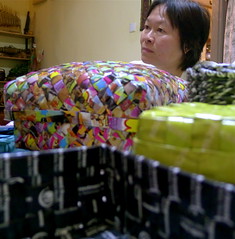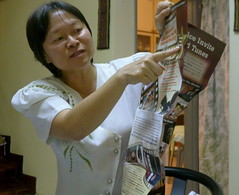Each day Chong Sheau Ching (C2) masterfully juggles her household responsibilities with managing eHomemakers (eH). She paused between taking care of her elderly parents, mentoring her teenage daughter, tending to the garden, making lunch for her employees, and running eH from her home office to answer a few questions for us!
1. As a child, what did you want to be when you grew up?
I didn’t have any aspiration; I was told that I should be a Chinese school teacher like my parents, grandparents (both sets) if I got to complete my 12 year of education. Failing which, I would be a clerk in a sundry shop or a coffee house. The most important seeds of thoughts given to me was: get married, be a good wife and have sons.
2. Aside from your family, what couldn’t you live without?
Dreaming of doing more than what I have resources and time for now — travel and discover new things, write, do documentary, all the fun things that also have social impact and change lives.
3. What is the most challenging aspect of maintaining the Salaam Wanita eco-baskets project?
Helping low-income disadvantaged women to achieve self-reliance is not a common social work here, let alone helping them to work @ home on innovative value-added work and self-empower themselves. Such work needs long -term patience, special tailoring of the activities when possible and deep determination to make things work by the project team. There is no fixed formula. The public, partners/potential partners often misunderstand the goals, and how it can be done properly for sustainability. Because of this, resources are constrained, making implementation difficult. Further more, such pro-poor concept is hard to implement among the beneficiaries because they are more used to activities that give short-term assistance than long -term hard work, so the drop-out rate after training is high as majority of the beneficiaries choose the short -term way to meet their immediate financial needs. Also, we specifically choose patients of chronic illnesses to help, they have a lot more medical or mental problems that complicate the self-reliance path. Often we have to deal with women passing away due to medical problems or inadequate medical care.
4. In what ways do you hope Kuala Lumpur will develop over the next 20 years?
A low-carbon footprint and crime rate city with proper public transport, efficient recycling systems and family-friendly activities.
5. What advice would you give aspiring social entrepreneurs?
Do what U are passionate about and really hang on for the long haul. Just remember this: Deepavali- the Hindu festival that celebrates light over darkness is real.
Posted By Maria Skouras
Posted Mar 29th, 2011



